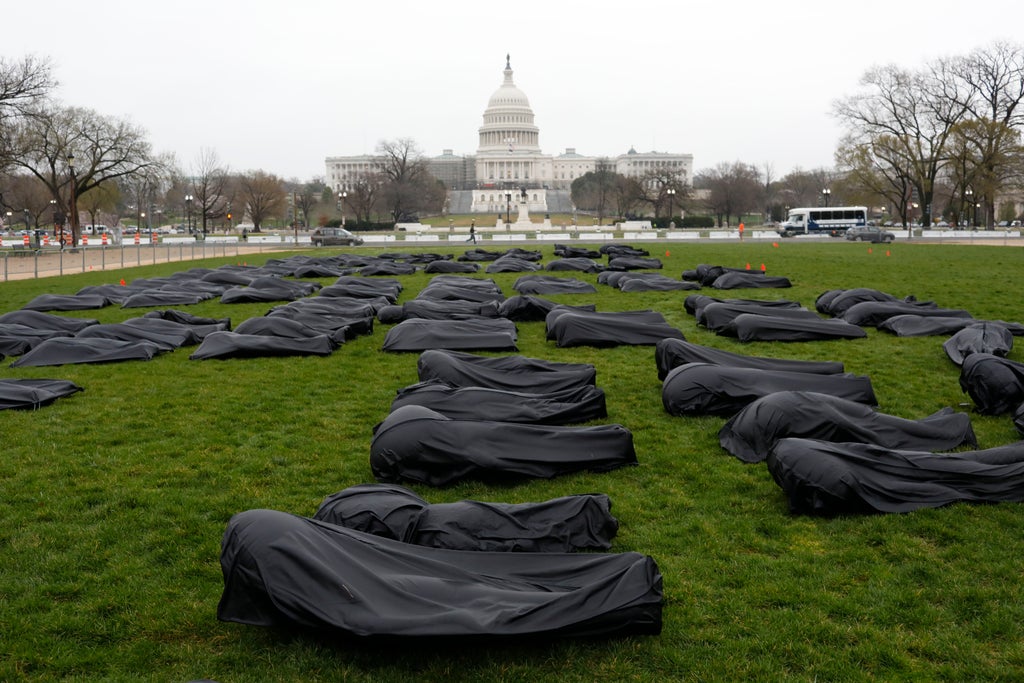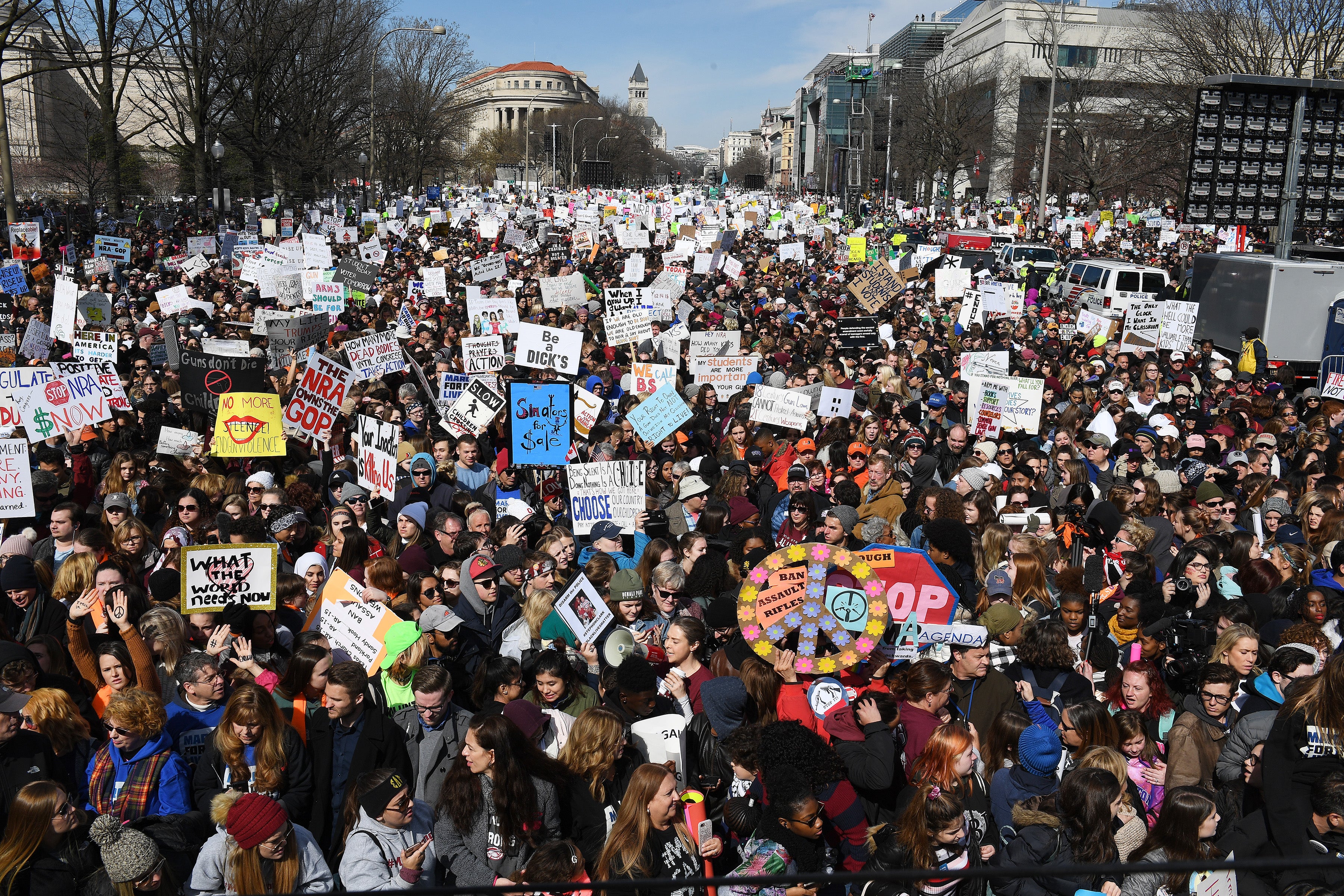
Jaclyn Corin, a survivor of the 2018 shooting at Marjory Stoneman Douglas High School in Parkland, Fla., hopes lawmakers will look out the U.S. Capitol windows on Thursday and see a grim representation of their failures.
On the National Mall Thursday morning, activists used more than 1,100 body bags to spell out “THOUGHTS AND PRAYERS,” a condolence often invoked after mass shootings – and one that gun-violence-prevention activists decry as hollow, as more people continue to die.
“This is still happening, and we need to step back into this to keep pushing and coercing our president and Congress to do something,” said Corin, 21, a co-founder of March for Our Lives and a government major at Harvard University. “If they continue to pursue a pathway of inaction, only more people are going to die.”
In the wake of the Parkland shooting, in which the attacker fatally shot 14 fellow students and three staff members, the survivors and other teenagers sparked a political movement demanding an end to school shootings and everyday gun violence. Four years ago Thursday, Corin and other survivors led hundreds of thousands of demonstrators in the District and across the country in protests to demand action. But the handful of activists gathered on the Mall Thursday offered a much starker message.
Under gray skies, survivors of the Parkland shooting and others who’d lost family and friends to shootings said they worked to elect President Joe Biden and members of Congress who promised to act but did not. Surrounded by the body bags – bags stuffed with inflatable balloons that made them seem all-too real – they said they were four years older and frustrated. While Democrats took the White House, Senate and House in 2020, no federal gun-safety legislation has been passed.

“I want this moment to act as a reminder of how angry and passionate we all felt back then,” Corin said. “The march in 2018 brought together so many people in this country in one collective mission to save lives.”
Since the Parkland shooting, more than 170,000 people in the United States have died from guns, organizers said, citing Gun Violence Archive data. Each body bag in the installation on the Mall represents more than 150 deaths.
Corin and others are calling on Senate Majority Leader Charles E. Schumer, D-N.Y., to bring universal background checks to the Senate floor for a vote, and asking supporters to sign a petition, with a goal of 1.2 million signatures. A substantial majority of Americans - 89% - support requiring background checks for all gun buyers, according to an April 2021 Quinnipiac University poll. Schumer’s office did not immediately respond to a request for comment.
Still, Corin called such a step the “bare minimum” and emphasized that the group is also asking Biden to do more to combat gun violence.
David Hogg, a Parkland survivor and a 21-year-old Harvard University student, said those who care about gun violence should be ready to mount primary challenges against elected officials who have not worked for change. Politicians who say they support gun-control measures who do nothing, Hogg said, are worse than gun-rights supporters, who are clear about where they stand: “At least the NRA doesn’t lie.”
Trevon Bosley, 23, said he lost a brother and a cousin to shootings in Chicago in the mid-aughts. Though he’s been active in the anti-gun violence movement since then, he said the crisis has only worsened.
“We don’t care about thoughts and prayers,” he said. “I wake up and listen to sirens. You asked us to vote for you and we did. We are not seeing the fruits of our labor.”
Last month, on the four-year anniversary of the school shooting, Manuel Oliver, father of Parkland shooting victim Joaquin Oliver, balanced on a construction crane near the White House, demanding a meeting with Biden and policies to combat gun violence. While he was 150 feet in the air, he unfurled a sign with a photo of his late son’s face.
Oliver and his wife, Patricia Oliver, were hoping to bring attention to the initiative they launched with March for Our Lives and Guns Down America, called Shock Market, which tracks gun violence since Biden’s inauguration.
On Thursday, Oliver said politicians shouldn’t expect support from survivors if they haven’t delivered results.
“Do they think we’re going to do the same thing we did a couple of years ago?” he said. “We’re not making that mistake again.”
The administration didn’t immediately respond to a request for comment Thursday, but previously pointed to actions the president has taken, or attempted to take, in the past year. The White House has claimed meaningful successes, including the hundreds of millions of dollars in stimulus funding that, at the administration’s urging, states and cities are using to address gun violence at the local level.
During the 2018 March for Our Lives, speakers did not focus just on mass shootings at suburban, White schools. They also emphasized the experiences of the far more common shootings that leave one or two young people dead and often affect predominantly Black and Hispanic students in poor neighborhoods.
Since Parkland, at least 89,000 students have been exposed to gun violence on K-12 campuses during regular hours, according to a database from The Washington Post. In 105 shootings between February 2018 and the end of January, 28 people were killed and another 90 were wounded. There were 42 school shootings in 2021 alone - more than in any other year since at least 1999 - despite ongoing closures of many schools during the pandemic.
In Washington D.C. and Maryland suburbs, homicides soared in 2021 to levels not seen in more than a decade, largely driven by gunfire.
In Montgomery County, which approached a number of killings not seen in at least 46 years, Police Chief Marcus Jones said he has “never seen the amount of guns and gun activity that is currently on our streets.” Christopher Geldart, the District’s deputy mayor for public safety and justice, told residents at an October meeting on Capitol Hill that there is “a gun crisis in the city.”
Four years ago, students from Parkland and the D.C. region turned their pain into inspiration, believing they could persuade adults to enact legislation that protects future generations from gun violence.
But in the absence of change, Daud Mumin, a 20-year-old from Salt Lake City who’s co-chair of the board of directors for March for Our Lives, said the body bags on the Mall reflect a “very dark reality.”
“Both nationally and in D.C., we’d love the conversation to be a reckoning of the past four years,” said Mumin, who graduated from Westminster College in December with a degree in justice studies. “We’re putting pressure on Congress, we’re putting pressure on the president, and we’re urging people to join this movement and to join in putting pressure on their respective politicians and legislators to really take this issue seriously.”
The Washington Post







